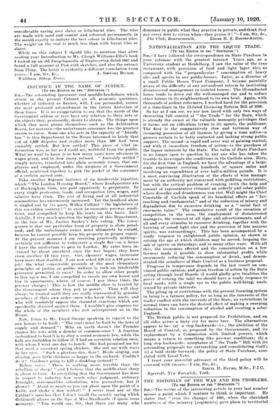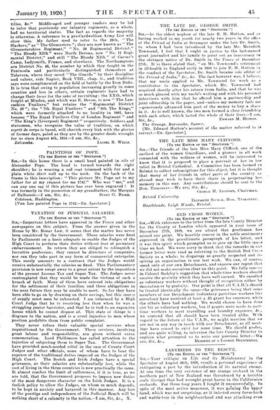THE HISTORIAN OF THE WAR AND HIS PROBLEMS. (To THE
EDITOR OF THE "SPECTATOR."] Sie,---The writer of the interesting article in your last number' misses a point. which I venture to think is important. He states that "even the changes of 1881, when the cherished numbers of the infantry [regiments] gave place to territorial - titles, &c." Middle-aged and younger readers may be led to infer that previously our infantry regiments, as a whole, had no territorial status. The fact as regards the majority is otherwise. A reference to a pre-Cardwellian Army List will show this. My father used to refer to the 28th, "The Slashers," as "The Gloucesters "; they are now known as "The Gloucestershire Regiment," "No. 28 Regimental District." "The Bloody XIth" -were North Devons, now "No. 11 Regi- mental District," and still "The Bloody XIth " of Caesar's Camp, Ladysmith, France, and elsewhere. The Northamptons are District No. 48, the number by which they fought in the Peninsula and particularly distinguished themselves at Talavera, where they saved "The Guards" by their discipline and valour, ride Napier, Book VIII., chap. ii., and tradition says were complimented on the field of battle by the Iron Duke. It is true that owing to population increasing greatly in some counties and less in others, certain regiments have had to change their locus for the sake of recruiting: the XXth, which fought at Minden, and which was E. Devon, is now "The Lan- cashire Fusiliers," but retains the "Regimental District No. 20 "; the "7th Royal Fusiliers" and "8th The Kings," which were formerly attached to no locality in 1881, have become "The Royal Fusiliers City of London Regiment" and "The King's (Liverpool) Regiment" respectively. Soldiers and statesmen, who recognize the value of tradition, on which esprit de corps is based, will cherish every link with the glories of former days, paled as they are by the greater deeds wrought for us since August 4th, 1914.-1 am, Sir, &c.,



































 Previous page
Previous page